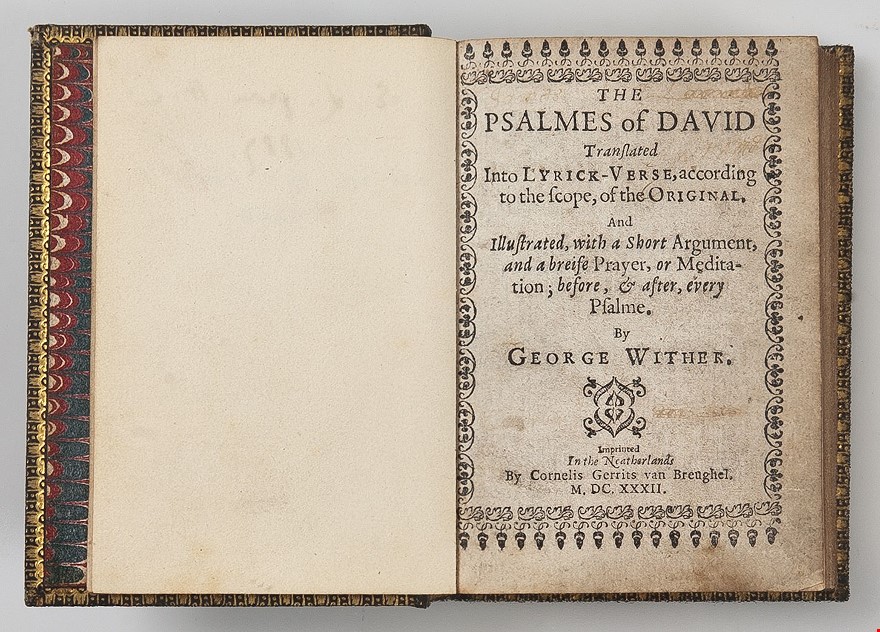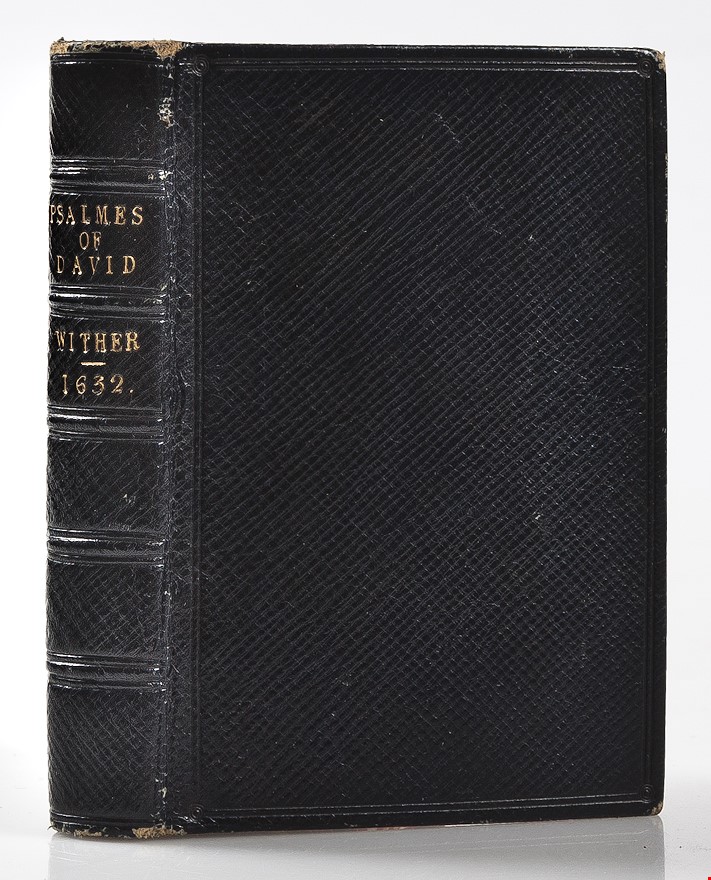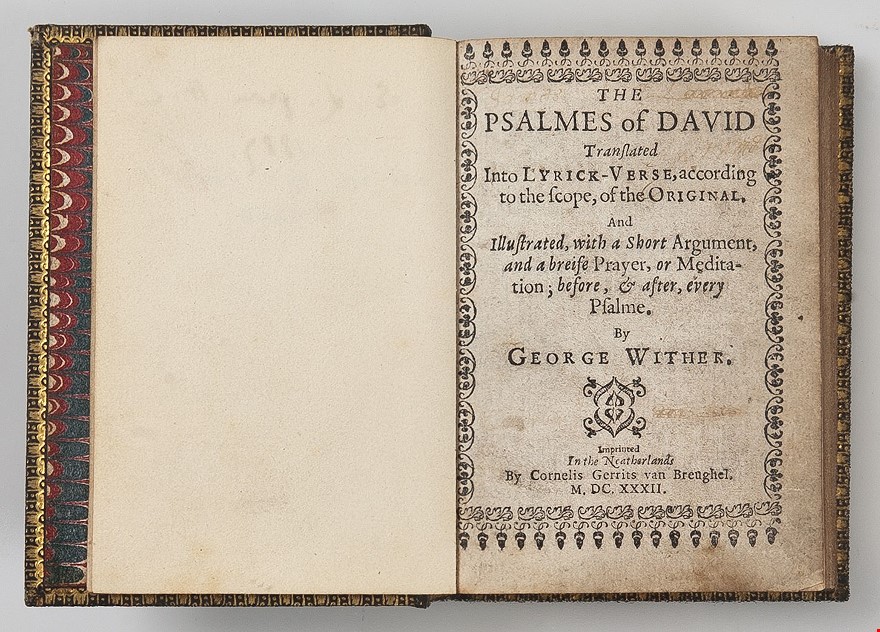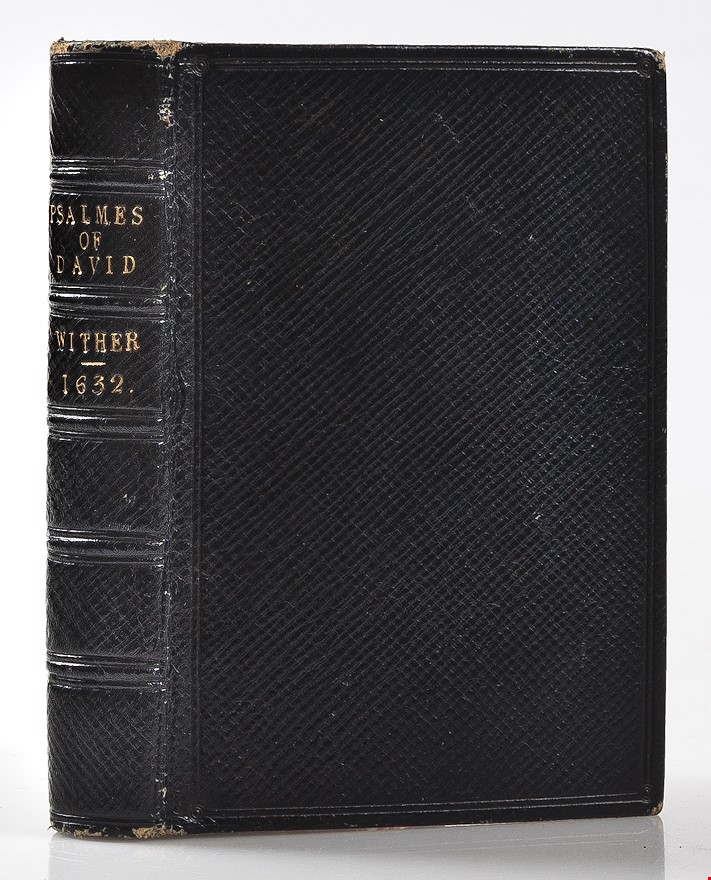The Psalmes of David
Wither George (1632)
£3200.00 [First Edition]
Please contact us in advance if you would like to view this book at our Curzon Street shop.
translated into lyrick-verse, according to the scope, of the original, and illustrated, with a short argument, and a breife prayer, or meditation; before, & after, every Psalme.
First Edition. 16mo in 8s. [16], 299, [1]pp. Title within a type-ornament border. Bound circa 1830 in diced maroon morocco by C. Murton, marbled endpapers, gilt edges (extremities slightly rubbed).
[?Amsterdam:] Imprinted in the Netherlands by Cornelis Gerrits van Breughel,
STC 2735 (+ in UK; Duke, Folger [x 2, inc. one ex Harmsworth], Harvard, Huntington, Illinois, Kansas, NYPL, Wisconsin-Madison in USA). Title slightly grubby, very lightly browned and dust-soiled throughout; top line of the verso of the second leaf closely shaved, just touching a few letters; a few headlines just shaved.
Dedicated to Princess Elizabeth, exiled "Winter Queen" of Bohemia and Princess Palatine of the Rhine, daughter of King James I, who lived in exile at a palace near Arnhem (her husband Frederick was to die in November the same year). Wither's second work, Epithalamia: or nuptiall poems (1612) on her marriage had been dedicated to her: "when my over-forward Muse first fluttered out of her neast, Shee obtained the preservation of her endangered Libertie, by your gratious favour: and perhaps, escaped also, thereby, that Pinioninge, which would have marred her flieng forth, for ever after".
In the dedication to the Psalms, Wither explains that his translation was written at the request of King James and finished shortly before his death ("I was commanded to perfect a Translation of the Psalmes, which he understood I had begunn; & by his encouragement, I finished the same about the tyme of his Translation to a better Kingdome") in 1625 as a companion to his "Hymnes and Songs of the Church", 1623 (with which it is "sometimes bound" - STC 25908).
Wither was obviously pleased with his translation - "It is, in my owne esteeme, the best Iewel, that I have: and, if it were answerable to my humble Affections, it would be the richest that ever was presented to a Princesse". In the preface he explains that his version is specially designed to be sung. "I have used some, varietie of Verse; Because, Prayers, Praises, Lamentations, Triumphs, and subiects which are Pastoral, Heroical, Elegicall, and mixt (all which are found in the Psalmes) are not properly exprest in one sort of Measure. Yet, respecting the[m] who cannot attaine to many Tunes, I confined my selfe to such kinds of Verse as I found in the old Psalmebook; fitting them in such manner, that every Psalme in this Booke, may [be] sung to some Tune formerly in use, either in the single, or in one of the double Translations". At the end he prints a "Table directing to what Tunes, heretofore in use; every Psalme in this Translation, may be sung".
King James had given Wither a grant of copyright for 51 years for his 1623 Hymnes and the right to have it bound up with every book of the Psalms in Metre sold - thus ensuring massive annual sales to the extreme annoyance of the Stationers' Company who held the rights to print the Psalms and attempted but failed to have it overturned by the Privy Council and Parliament, leading to Wither's satirical attack on them, The Schollers purgatory (1624). Eventually Wither surrendered his patent for "yearly great sums of money". Hence the publication of this volume, which continues the attack, with a Netherlands imprint.
As Edward Rossingham reported in a letter to Sir Thomas Puckering on 23 Jan. 1634 Wither received a new patent from Charles I on the same lines as his previous one and the Stationers reacted to it in the same way but with a more favourable result to themselves: "Upon Friday last, Wither, the English poet, convented before the board all or most of the stationers of London. The matter was this. Mr. Wither hath, to please himself, translated our singing psalms into another verse, which he counts better than those the Church hath so long used: and therefore he hath been at the charge to procure a patent from his majesty, under the broad seal, that his translation shall be printed and bound to all Bibles that are sold. The stationers refusing to bind them, and to sell them with the Bible, (the truth is, nobody would buy the Bible with such a clog at the end of it) and because some of them stood upon their guard, and would not suffer Mr. Wither with his officers to come into their shops and seize such Bibles as wanted his additions, therefore he complained of them for a contempt of the great seal. After their lordships had heard the business pro et con., at length their lordships thought good to damn his patent in part; that is, that the translation should no longer be sold with the Bible, but only by itself. And for my part, I think their lordships have done very well in ordering it in this manner." - Robert F. Williams, ed., The Court and Times of Charles the First (1848), II, pp. 235/6.
The printer Gerrits van Breughel is recorded as working in Amsterdam between 1631 and 1636. This is his only English printing and he has done a good job of setting a difficult little book.
Provenance: 1: Old ink inscription on the title faded and deleted. 2: Ink inscription on the flyleaf: "E.L. from H.L. 1887". 2: Probably: Sir R. Leicester Harmsworth, 1st. Bart., (1870-1937), with characteristic pencil classification "Psalms" diagonally across the top corner of the front flyleaf, but not in the 1946 Sotheby sale of his bibles and prayer books - one of the two Folger copies is ex-Harmsworth]. 3: Ink inscription on the flyleaf: "and now B.H. from EH 1946".
Stock Code: 57357







